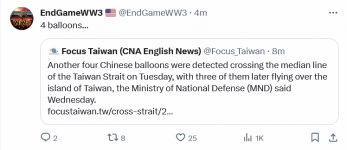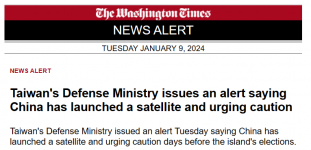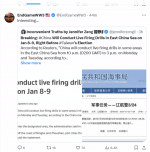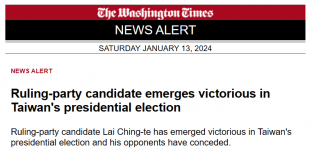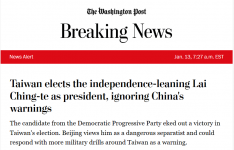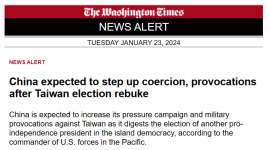You are using an out of date browser. It may not display this or other websites correctly.
You should upgrade or use an alternative browser.
You should upgrade or use an alternative browser.
WAR CHINA THREATENS TO INVADE TAIWAN
- Thread starter danielboon
- Start date
jward
passin' thru
insiderpaper.com
Taiwan detects two Chinese balloons in new year
AFP
~2 minutes
Two Chinese balloons were detected moving across the median line separating Taiwan from China, with one flying directly above the island, Taiwan’s Ministry of National Defence said Tuesday.
The balloons were seen crossing the median line over the Taiwan Strait — a sensitive waterway separating the island from China — late January 1 at two locations, one near the western city of Chiayi and another by Keelung in the north.
An accompanying graphic released by the ministry showed one balloon headed east directly above the island after appearing northwest of Chiayi on the western coast.
They were at “the altitude of approximately 30,000 and 32,000 feet (9-10 kilometres),” it said in a statement.
“The balloons headed northeast and disappeared at 23:43 yesterday and 00:43 today.”
The sightings of Chinese balloons began last month as the island’s pivotal presidential election on January 13 approaches.
Taiwanese authorities have so far reported six incidents in December.
Chinese balloons became a politically fraught topic in February when the United States shot down what it called a spy balloon over its territory, with Beijing saying the craft was a civilian airship blown off course.

 insiderpaper.com
insiderpaper.com
Taiwan detects two Chinese balloons in new year
AFP
~2 minutes
Two Chinese balloons were detected moving across the median line separating Taiwan from China, with one flying directly above the island, Taiwan’s Ministry of National Defence said Tuesday.
The balloons were seen crossing the median line over the Taiwan Strait — a sensitive waterway separating the island from China — late January 1 at two locations, one near the western city of Chiayi and another by Keelung in the north.
An accompanying graphic released by the ministry showed one balloon headed east directly above the island after appearing northwest of Chiayi on the western coast.
They were at “the altitude of approximately 30,000 and 32,000 feet (9-10 kilometres),” it said in a statement.
“The balloons headed northeast and disappeared at 23:43 yesterday and 00:43 today.”
The sightings of Chinese balloons began last month as the island’s pivotal presidential election on January 13 approaches.
Taiwanese authorities have so far reported six incidents in December.
Chinese balloons became a politically fraught topic in February when the United States shot down what it called a spy balloon over its territory, with Beijing saying the craft was a civilian airship blown off course.

Taiwan detects two Chinese balloons in new year
Two Chinese balloons were detected moving across the median line separating Taiwan from China, with one flying directly above the island, Taiwan's
danielboon
TB Fanatic
Taiwan Strait crisis rated Tier 1 risk by CFR
Intensified military pressure exerted by China around Taiwan presidential election could trigger 'severe cross-strait crisis'
1020By Keoni Everington, Taiwan News, Staff Writer
2024/01/05 15:17
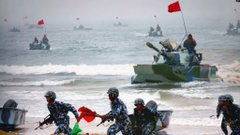
People's Liberation Army Navy Marine Corps units conduct an amphibious landing during a training exercise. (US Department of Defense image)
TAIPEI (Taiwan News) — The U.S. think tank Council on Foreign Relations (CFR) said in its latest report that a "severe cross-strait crisis" is at the highest tier level among potential conflicts in the world for the fourth year in a row.
On Thursday (Jan. 4), the CFR released its 2024 edition of the Preventive Priorities Survey. Since 2008, the CFR's foreign policy experts have evaluated 30 ongoing or potential violent conflicts around the world and divided them into three tiers according to the probability of occurrence in the next year and the degree of impact on U.S. interests.
The report noted that last year the world saw "violent conflict erupt or grow worse in many regions." It said there is a "growing risk of armed conflict" between the U.S. and China due to roiling tensions over the Taiwan Strait and South China Sea.
According to the findings of experts surveyed by the CFR's Center for Preventive Action in November, eight scenarios were included in the Tier 1 contingencies with a high-to-moderate probability of occurrence and a high impact on U.S. interests. At the top of this list is burgeoning political polarization in the U.S.
A serious situation involving Taiwan was rated as "moderate" in terms of likelihood among the Tier 1 contingencies, but its impact was rated as "high." In this scenario "intensified economic and military pressure" exerted by China on Taiwan, particularly around the Taiwanese presidential election, could trigger a "severe cross-strait crisis" involving the U.S. and other countries in the region.
As the rivalry between the U.S. and China has intensified in recent years, the two sides were included in the report for the first time in 2019 due to tensions over Taiwan, with the situation being classified as a Tier 2 contingency that year and in 2020. However, in 2021, the situation was upgraded to Tier 1, and this year marks the fourth consecutive year that a severe cross-strait crisis has been listed as Tier 1. Taiwan Strait crisis rated Tier 1 risk by CFR | Taiwan News | 2024-01-05 15:17:00
northern watch
TB Fanatic
A couple of publicized "steel beaches" by SSBNs near Australia or the Philippines would be a good counter "cutlass rattling" in reply to all the "wolf 'diplomacy'" and "dao rattling" on the part of the CCP.
That being said, until its clear that there's a POTUS who's really "in charge" 24/7 the CCP is still going to push until the get real push back.
That being said, until its clear that there's a POTUS who's really "in charge" 24/7 the CCP is still going to push until the get real push back.
jward
passin' thru
Indo-Pacific News - Geo-Politics & Defense News
@IndoPac_Info
#Taiwan election could decide whether #China invades
If Taiwan’s incumbent, independence-oriented party stays in power, Chinese leader Xi Jinping might feel he has no choice but to force the issue of reunification.
Conversely, if the opposition – which agrees with Beijing that Taiwan and the mainland are part of “one China” but not about who governs it – wins, Beijing might feel it has more space to be patient on the issue.
In the run-up to the vote, Beijing has ramped up military exercises in and around the Taiwan Strait in an apparent warning to Taiwanese voters. On January 6, in one of the most recent incidents, China sent a series of balloons over the island, which the Taiwan government cited as a threat to air travel and an attempt at intimidation.
Meanwhile, in his annual New Year’s address, Xi stated that “China will surely be reunified,” raising fears internationally that he intends to pursue the issue militarily if necessary.
For Washington, too, the outcome of the vote will have implications. The United States has cultivated strong ties with the current leadership of Taiwan. But recent tensions in the strait have raised the risk of war.
US actions deemed provocative by Beijing, such as the 2022 visit of then-Speaker of the House Nancy Pelosi to Taiwan, have resulted in China upping its military threats in the strait. And this has raised speculation that China’s patience is growing thin and its timeline for reunification is growing shorter.
Meanwhile, questions about the US capacity to respond to any Chinese aggression over Taiwan have risen; the specter of war in a third region of the world – after Ukraine and Israel – worries national security leadership in Washington.
Independence on the ballot?
The presidential election in Taiwan has come down to a three-way race. The front-runner is current Vice President William Lai, who is the candidate of the Democratic Progressive Party. The DPP views Taiwan as a sovereign country and does not seek reunification with China.
Lai’s challengers are New Taipei City mayor Hou Yu-ih, of the Kuomintang (KMT), and Ko Wen-je, a former mayor of Taipei running for the center-left Taiwan People’s Party (TPP). The KMT embraces the idea of future reunification with China under a democratic government.
The TPP criticizes both DPP and KMT platforms on cross-strait relations as too extreme and seeks a middle ground that maintains the status quo: A Taiwan that is de facto sovereign but with strong economic and cultural ties with China.
Taiwan law mandates that no polls are published in the 10 days before the election. As of Jan. 3, when the final polls were published, averages had Lai leading with 36%, with Hou at 31% and Ko at 24%.
Lai has consistently led in the polls, prompting the KMT and TPP to earlier consider running on a joint ticket. But the two parties failed to agree on terms, and the coalition attempt imploded.
This may prove crucial, as joining forces may have represented the best chance of a KMT candidate being elected – an outcome that may have cooled tensions with Beijing.
Taiwanese democracy
The island of Taiwan has been governed as the “Republic of China” since 1949 when the KMT lost a civil war to the Chinese Communist Party. The CCP set up the People’s Republic of China on the mainland, and the KMT retreated to Taiwan.
For decades, both the Republic of China and the People’s Republic of China diverged on every possible policy except one: Both governments agreed that there was only one China, and that Taiwan was a part of China. They each sought to unite Taiwan and the mainland – but under their own rule.
Although that remains the goal in Beijing today, for Taiwan the outlook has started to change.
The change began with Taiwanese democratization – a process that began in the early 1990s after decades of autocratic rule. After gradually rolling out direct elections for the legislature, governors and mayors, the island held its first democratic election for president in 1996.
Despite Beijing holding military exercises in the Taiwan Strait in an attempt to interfere with the vote, the KMT-affiliated incumbent won against a DPP candidate with strong ties to the Taiwan independence movement.
Four years later, the DPP’s candidate won and started the first of two consecutive terms. In 2008, a KMT candidate returned to power. But since 2016, Taiwan has been led by Tsai Ing-wen of the DPP.
Cross-strait tensions tend to rise when the DPP is in office and calm somewhat when the KMT is in power. This isn’t because the KMT agrees with Beijing over the status of Taiwan – the party has always been clear that unification could happen only under its own government and never under the leadership of the Communist Party in Beijing. But the KMT affirms the idea that eventual unification with China is its goal for Taiwan.
In 1992, representatives of the KMT and the CCP met in Hong Kong and reached the “1992 Consensus.” Despite the name, the two sides do not fully agree on what it meant. The KMT affirmed the idea of one China but noted disagreement on what the government of that China should be; the People’s Republic of China interpreted it as affirming one China under CCP rule.
Still, the 1992 Consensus became the basis of a series of policies strengthening cross-strait ties, and it made KMT-led governments easier for the PRC to tolerate.
Pro-independence sentiment
Though speculation about the geopolitical fallout and China’s reaction to the election has dominated coverage of the vote around the world, for Taiwan voters, independence is one of several critical issues the island faces.
The economy frequently rises even above cross-strait issues in importance, with many voters expressing concern over the rapid rise of housing prices, stagnating salaries, slow economic growth and how the incumbent party handled the Covid-19 pandemic.
On the issue of independence itself, Taiwanese polls have shown a creep toward pro-independence sentiment. As of September 2023, nearly half of Taiwanese voters said they preferred independence (48.9%) for the island, while 26.9% sought a continuation of the status quo. A shrinking minority – now just 11.8% – said they hoped for future reunification.
If the DPP remains in power, Beijing may feel the pressure to force the issue of reunification.
Xi has called for the Chinese military to be capable of a successful cross-strait invasion by 2027, though a forceful reunification effort might include a combination of economic blockade and military pressure.
If that were to be the case, US commitments to Taiwan – along with US credibility among its Asian allies – could be on the line. President Joe Biden has repeatedly said that he is prepared to defend the island militarily against an attack from mainland China.
Already in 2024, the US is having to contend with two significant conflicts that are demanding its attention. How Taiwanese voters mark their ballot – and how policymakers in Beijing respond – may determine whether a third war is more or less likely.
Meredith Oyen is Associate Professor of History and Asian Studies, University of Maryland, Baltimore County.

 asiatimes.com
asiatimes.com
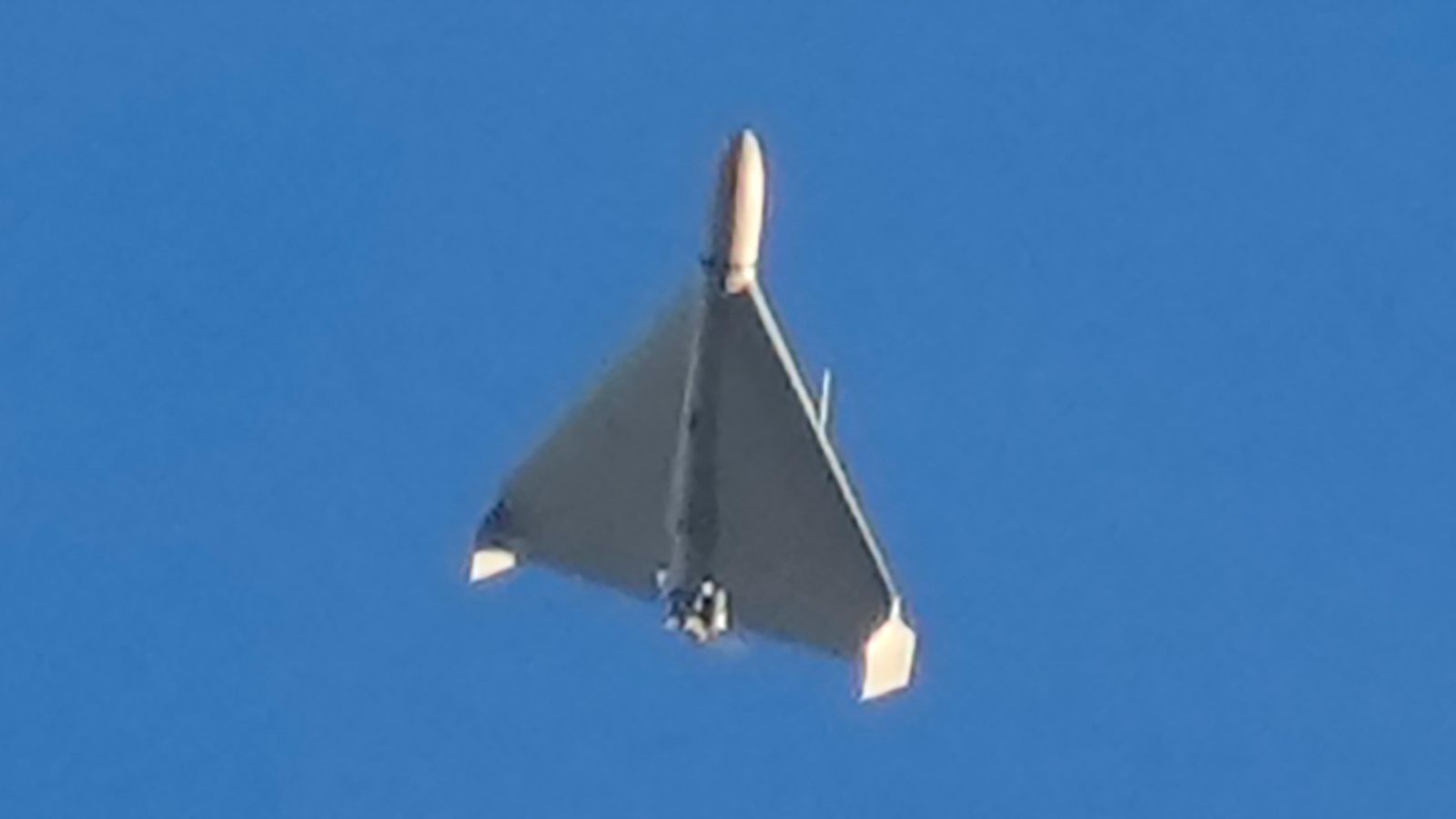
 news.sky.com
news.sky.com
@IndoPac_Info
#Taiwan election could decide whether #China invades
If Taiwan’s incumbent, independence-oriented party stays in power, Chinese leader Xi Jinping might feel he has no choice but to force the issue of reunification.
Conversely, if the opposition – which agrees with Beijing that Taiwan and the mainland are part of “one China” but not about who governs it – wins, Beijing might feel it has more space to be patient on the issue.
In the run-up to the vote, Beijing has ramped up military exercises in and around the Taiwan Strait in an apparent warning to Taiwanese voters. On January 6, in one of the most recent incidents, China sent a series of balloons over the island, which the Taiwan government cited as a threat to air travel and an attempt at intimidation.
Meanwhile, in his annual New Year’s address, Xi stated that “China will surely be reunified,” raising fears internationally that he intends to pursue the issue militarily if necessary.
For Washington, too, the outcome of the vote will have implications. The United States has cultivated strong ties with the current leadership of Taiwan. But recent tensions in the strait have raised the risk of war.
US actions deemed provocative by Beijing, such as the 2022 visit of then-Speaker of the House Nancy Pelosi to Taiwan, have resulted in China upping its military threats in the strait. And this has raised speculation that China’s patience is growing thin and its timeline for reunification is growing shorter.
Meanwhile, questions about the US capacity to respond to any Chinese aggression over Taiwan have risen; the specter of war in a third region of the world – after Ukraine and Israel – worries national security leadership in Washington.
Independence on the ballot?
The presidential election in Taiwan has come down to a three-way race. The front-runner is current Vice President William Lai, who is the candidate of the Democratic Progressive Party. The DPP views Taiwan as a sovereign country and does not seek reunification with China.
Lai’s challengers are New Taipei City mayor Hou Yu-ih, of the Kuomintang (KMT), and Ko Wen-je, a former mayor of Taipei running for the center-left Taiwan People’s Party (TPP). The KMT embraces the idea of future reunification with China under a democratic government.
The TPP criticizes both DPP and KMT platforms on cross-strait relations as too extreme and seeks a middle ground that maintains the status quo: A Taiwan that is de facto sovereign but with strong economic and cultural ties with China.
Taiwan law mandates that no polls are published in the 10 days before the election. As of Jan. 3, when the final polls were published, averages had Lai leading with 36%, with Hou at 31% and Ko at 24%.
Lai has consistently led in the polls, prompting the KMT and TPP to earlier consider running on a joint ticket. But the two parties failed to agree on terms, and the coalition attempt imploded.
This may prove crucial, as joining forces may have represented the best chance of a KMT candidate being elected – an outcome that may have cooled tensions with Beijing.
Taiwanese democracy
The island of Taiwan has been governed as the “Republic of China” since 1949 when the KMT lost a civil war to the Chinese Communist Party. The CCP set up the People’s Republic of China on the mainland, and the KMT retreated to Taiwan.
For decades, both the Republic of China and the People’s Republic of China diverged on every possible policy except one: Both governments agreed that there was only one China, and that Taiwan was a part of China. They each sought to unite Taiwan and the mainland – but under their own rule.
Although that remains the goal in Beijing today, for Taiwan the outlook has started to change.
The change began with Taiwanese democratization – a process that began in the early 1990s after decades of autocratic rule. After gradually rolling out direct elections for the legislature, governors and mayors, the island held its first democratic election for president in 1996.
Despite Beijing holding military exercises in the Taiwan Strait in an attempt to interfere with the vote, the KMT-affiliated incumbent won against a DPP candidate with strong ties to the Taiwan independence movement.
Four years later, the DPP’s candidate won and started the first of two consecutive terms. In 2008, a KMT candidate returned to power. But since 2016, Taiwan has been led by Tsai Ing-wen of the DPP.
Cross-strait tensions tend to rise when the DPP is in office and calm somewhat when the KMT is in power. This isn’t because the KMT agrees with Beijing over the status of Taiwan – the party has always been clear that unification could happen only under its own government and never under the leadership of the Communist Party in Beijing. But the KMT affirms the idea that eventual unification with China is its goal for Taiwan.
In 1992, representatives of the KMT and the CCP met in Hong Kong and reached the “1992 Consensus.” Despite the name, the two sides do not fully agree on what it meant. The KMT affirmed the idea of one China but noted disagreement on what the government of that China should be; the People’s Republic of China interpreted it as affirming one China under CCP rule.
Still, the 1992 Consensus became the basis of a series of policies strengthening cross-strait ties, and it made KMT-led governments easier for the PRC to tolerate.
Pro-independence sentiment
Though speculation about the geopolitical fallout and China’s reaction to the election has dominated coverage of the vote around the world, for Taiwan voters, independence is one of several critical issues the island faces.
The economy frequently rises even above cross-strait issues in importance, with many voters expressing concern over the rapid rise of housing prices, stagnating salaries, slow economic growth and how the incumbent party handled the Covid-19 pandemic.
On the issue of independence itself, Taiwanese polls have shown a creep toward pro-independence sentiment. As of September 2023, nearly half of Taiwanese voters said they preferred independence (48.9%) for the island, while 26.9% sought a continuation of the status quo. A shrinking minority – now just 11.8% – said they hoped for future reunification.
If the DPP remains in power, Beijing may feel the pressure to force the issue of reunification.
Xi has called for the Chinese military to be capable of a successful cross-strait invasion by 2027, though a forceful reunification effort might include a combination of economic blockade and military pressure.
If that were to be the case, US commitments to Taiwan – along with US credibility among its Asian allies – could be on the line. President Joe Biden has repeatedly said that he is prepared to defend the island militarily against an attack from mainland China.
Already in 2024, the US is having to contend with two significant conflicts that are demanding its attention. How Taiwanese voters mark their ballot – and how policymakers in Beijing respond – may determine whether a third war is more or less likely.
Meredith Oyen is Associate Professor of History and Asian Studies, University of Maryland, Baltimore County.

Taiwan election could decide whether China invades
When the votes are being tallied in Taiwan’s presidential election, it won’t be only the 23.6 million inhabitants of the island eagerly awaiting a result
 asiatimes.com
asiatimes.com

'Explosive' new attack drone developed by Iran for Russia's war in Ukraine
Tehran also appears close to providing Moscow with ballistic missiles for the first time since the start of the full-scale invasion.
jward
passin' thru
Indo-Pacific News - Geo-Politics & Defense News
@IndoPac_Info
Xi, Biden and the $10 trillion cost of war over #Taiwan
War over Taiwan would have a cost in blood and treasure so vast that even those unhappiest with the status quo have reason not to risk it.
Very long article text
Bloomberg Economics estimate the price tag at around $10 trillion, equal to about 10% of global gross domestic product — dwarfing the blow from the war in Ukraine, COVID-19 pandemic and 2007-2008 Global Financial Crisis.
China’s rising economic and military heft, Taiwan’s burgeoning sense of national identity, and fractious relations between Beijing and Washington mean the conditions for a crisis are in place. With cross-strait relations on the ballot, Taiwan’s Jan. 13 election is a potential flashpoint.
Few put a high probability on an imminent Chinese invasion. The People’s Liberation Army (PLA) isn't massing troops on the coast. Reports of corruption in China’s military cast doubts on President Xi Jinping's ability to wage a successful campaign.
U.S. officials say tensions eased somewhat at the November summit between President Joe Biden and Xi, who pledged "heartwarming” measures to woo foreign investors.
Still, the outbreak of war in Ukraine and the Gaza Strip are reminders of how long-simmering tensions can erupt into conflict. Everyone from Wall Street investors to military planners and the swathe of businesses that rely on Taiwan’s semiconductors are already moving to hedge against the risk.
National security experts in the Pentagon, think tanks in the United States and Japan, and global consulting firms are gaming out scenarios from a Chinese maritime "quarantine" of Taiwan, to the seizure of Taiwan's outlying islands, and a full-scale Chinese invasion.
Jude Blanchette, a China expert at the Center for Strategic and International Studies, says interest in a Taiwan crisis from multinational firms he advises has "exploded” since Russia’s 2022 invasion of Ukraine. The subject comes up in 95% of conversations, he said.
Russia’s invasion of Ukraine, and the semiconductor shortage as the world reopened from COVID-19 lockdowns, provide a small glimpse of what’s at stake for the global economy. The impact of war in the Taiwan Strait would be far bigger.
Taiwan makes most of the world’s advanced logic semiconductors, and a lot of lagging edge chips — technologies older than 7 nanometers — as well. Globally, 5.6% of total value added comes from sectors using chips as direct inputs — nearly $6 trillion.
Total market cap for the top 20 customers of chip giant Taiwan Semiconductor Manufacturing Co. (TSMC) is around $7.4 trillion. The Taiwan Strait is one of the world’s busiest shipping lanes.
Modeling the cost of a crisis
Bloomberg Economics has modeled two scenarios: a Chinese invasion drawing the U.S. into a local conflict and a blockade cutting Taiwan off from trade with the rest of the world.
A suite of models is used to estimate the impact on GDP, taking account of the blow to semiconductor supply, disruption to shipping in the region, trade sanctions and tariffs, and the impact on financial markets.
For the main protagonists, other major economies, and the world as a whole, the biggest hit comes from the missing semiconductors. Factory lines producing laptops, tablets and smartphones — where Taiwan’s high-end chips are the irreplaceable "golden screw” — would stall. Autos and other sectors that use lower-end chips would also take a significant hit.
Barriers to trade and a significant risk-off shock in financial markets add to the costs.
In the case of a war:
Taiwan’s economy would be decimated. Based on comparable recent conflicts, Bloomberg Economics estimates a 40% blow to GDP. A population and industrial base concentrated on the coast would add to the human and economic cost.
For China, with relations to major trade partners turned off and no access to advanced semiconductors, its GDP would suffer a 16.7% blow.
For the U.S., further from the center of the action but still with a lot at stake — through the reliance of Apple on the Asian electronics supply chain, for example — GDP would be down 6.7%.
For the world as a whole, GDP would be down 10.2%, with South Korea, Japan and other East Asian economies most impacted. A key assumption in this scenario is that the U.S. would succeed in enlisting allies in concerted and severe economic sanctions against China.
U.S. officials say that the Chinese reaction to then-U.S. House Speaker Nancy Pelosi’s visit to Taipei in August 2022 helped convince other Group of Seven countries that the risk of conflict is real.
Beijing saw it as a shift in the status quo that made Xi appear weak, particularly after domestic commentators suggested that China would be able to stop her from landing in Taipei.
The fallout from the Pelosi visit, which saw China conduct large-scale naval drills seen as practice runs for a blockade, helped build diplomatic muscle memory for concerted reactions, the U.S. officials said.
"China’s rhetoric and the PLA response to Pelosi’s visit triggered a wave of quiet corporate contingency and scenario planning,” said Rick Waters, managing director of the China practice at Eurasia Group and formerly the top China policy official at the U.S. State Department.
Bloomberg Economics also modeled what a yearlong blockade of Taiwan by mainland China would mean for the global economy:
For Taiwan, a small, open economy that has thrived through trade, GDP in the first year would be down 12.2%.
For China, the U.S., and the world as a whole, GDP in the first year would be down 8.9%, 3.3% and 5% respectively.
The reason for the smaller impact relative to the war scenario is that while the global economy still loses access to all of Taiwan’s chips, other shocks — including tariffs between the U.S. along with its allies and China, the disruption to Asian shipping and financial market fallout — are scaled down.
The Bloomberg Economics exercise is — as far as we are aware — unique in bringing together geopolitical and economic modeling expertise. Still, the results are significantly driven by the scenario assumptions, and the band of uncertainty is wide. A war or blockade of shorter duration, and with less-significant disruptions to semiconductor supply and trade, would have a smaller impact.
A consequential election
Even if the outcome of Taiwan’s election doesn’t trigger an immediate crisis, it will define the direction of cross-strait relations.
Lai Ching-te — currently serving as vice president in the Democratic Progressive Party (DPP) administration — has been at pains to present himself as a continuity candidate, with no plans to disturb relations with Beijing.
In the past, though, he described himself as a "pragmatic worker for Taiwanese independence.”
For Beijing, which views the island as part of its territory, any formal push for independence would cross a red line. At Xi's meeting with Biden, the Chinese leader expressed deep concern about the possibility of a Lai win, according to a senior administration official.
The DPP counterpoint, which aligns with the assessment in Washington, is that Beijing’s belligerence is the problem — not Taiwan’s desire for continued autonomy.
Lai’s opponents — Hou Yu-ih of the Kuomintang and Ko Wen-je of the Taiwan People’s Party — are both promising pragmatic steps to improve relations with Taiwan’s giant neighbor, without sacrificing the island’s de facto independence.
U.S. officials say China may be planning a multipronged reaction to the election, with military incursions, economic sanctions and gray-zone tactics such as cyberattacks.
Officials in Washington and Taipei say the period from the election in January to inauguration of the new president in May is a danger zone for Chinese actions aimed at hemming in Taiwan’s next president.
Straitened circumstances
Whoever wins will have to deal with a changed, and challenging, set of cross-strait realities.
In 1979, when the U.S. switched diplomatic recognition from Taipei to Beijing, U.S. GDP was 10 times that of China, China’s military was in the early stages of modernization, and Taiwan was still under single-party rule.
Fast forward to today and China’s GDP has closed much of the gap with the U.S., its military boasts near-peer status — especially close to home — and Taiwan’s liberal democracy is a visible contrast to China’s authoritarian system.
Statements by leaders in Beijing and Washington have added to the tension.
Xi has said more than once that Taiwan is not an issue that can be "passed down generation after generation.” Along with his efforts to modernize the military, those statements have spurred speculation he wants to deliver unification on his watch, with 2027 cited as a danger year by U.S. intelligence and military officials.
At his meeting with Biden, Xi vented frustration with the view that China's forces were aiming at readiness for an invasion by 2027, which he said was mistaken, according to a senior U.S. official.
For his part, Biden has said the U.S. would come to Taiwan's aid in the event of a Chinese invasion. That bluntness eroded layers of carefully crafted ambiguity about the U.S. position, stoking anger in China and concerns the U.S. is emboldening pro-independence boisterousness.
Bloomberg Economics’ Taiwan stress index — based on warning words used by China’s Ministry of Foreign Affairs and military incursions in Taiwan’s air defense identification zone — shows the temperature over the last year and a half elevated.
Investors and businesses are already preparing for the worst.
Kirk Yang, chairman of equity investment fund Kirkland Capital and an expert on Asia technology firms, says the fund’s position in Taiwan is now close to zero. Geopolitical tensions have "added incentive to scale back investments at a faster pace,” he said.
He’s in good company.
Legendary investor Warren Buffett sold down his stake in TSMC in the first quarter of 2023, citing geopolitical risk as the reason.
Businesses and governments are also making preparations. Greenfield investment in electronics and electrical equipment rocketed to $181 billion in 2022 from $48 billion in 2020 as governments in the U.S., Japan and Germany opened their wallets to diversify sources of semiconductor supply.
If there’s an upside from the Bloomberg Economics analysis, perhaps it’s this: The $10 trillion cost of a crisis would be so high for all players that the incentive to avoid it is strong.
The status quo might be no one’s ideal outcome, but for Taipei, Beijing and Washington, the alternatives are worse.
That’s a reason Taiwan’s ambiguous autonomy might remain an equilibrium outcome, even as the conditions that make it so shift.
Methodology
For the war and blockade scenarios, Bloomberg Economics use a suite of models to assess the impact of disruptions to semiconductor supply, trade barriers, and financial market shocks.
Supply chain disruptions are assessed using Organization for Economic Cooperation and Development (OECD) Trade in Value Added data for 2018.
OECD input-output data are used to estimate the direct disruptions to sectors using semiconductors as an input (computer, electronics and optical products; electrical equipment; machinery and equipment; motor vehicles, trailers and semi-trailers; other transport equipment), and to assess the spillover impact onto other sectors — for example the impact on metal output if production of automobiles slows.
Trade shocks are assessed using the World Trade Organization Global Trade Model (GTM) (Aguiar et al, 2019). The GTM is a recursive computational general equilibrium model based on the Global Trade Analysis Project model (version 7) (Corong et al, 2017). We shock tariffs and non tariff measures, including as a proxy for sanctions and export controls.
U.S. allies are defined based on trade shares, treaty relationships, and Bloomberg Economics’ judgment. Australia, Canada, the European Free Trade Association, the European Union, Japan, Mexico, South Korea and the United Kingdom are defined as U.S. allies.
Financial shock impacts are estimated following a structural approach based on the Bayesian Global Vector Autoregression model (Bock, Feldkircher and Huber, 2020). The model is amended slightly by adding log real equity prices for each country as in Mohaddes and Raissi (2020).
Uncertainty in the financial markets is modeled as a global shock to the volatility index.
A key uncertainty in the analysis is the extent to which missing semiconductor output from Taiwan could be replaced by output in other locations, worked around by manufacturing firms, or backstopped from inventories.
The Bloomberg Economics scenarios assume that all production using semiconductors as inputs has to be reduced in line with the reduction in semiconductors availability.
For advanced electronics such as smartphones using cutting-edge logic chips, this translates into a 60% reduction in production in the blockade scenario, rising to 85% in the war scenario when access to South Korean production is also severely curtailed.
For sectors using lagging-edge logic chips, such as those used in autos and home electronics, that means 35% in the blockade scenario when Taiwan’s output goes offline, and 62% in the war scenario when output from China, Japan, and South Korea is also lost.
The reality could end up being better. For example, other countries could ramp up chip production, or auto firms and other manufacturers might find workarounds for missing inputs.
It could also be worse. For example, if Taiwan’s chips are not replaceable and their use is distributed widely across products. If production for all sectors using leading and lagging-edge chips goes to zero, the blow to global GDP in the war scenario increases from 10.2% to 14%.
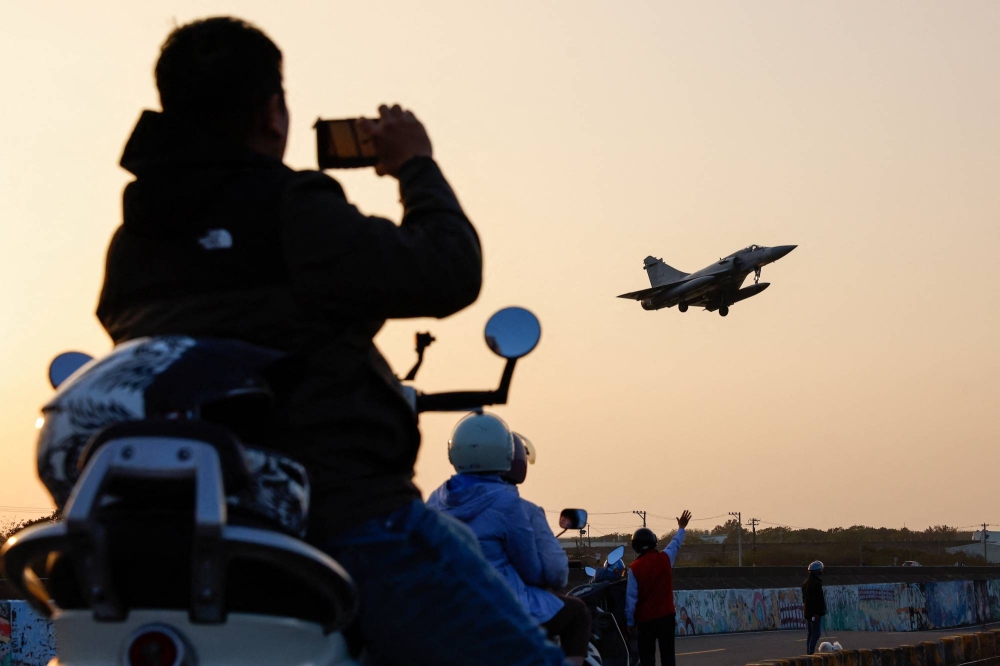
 japantimes.co.jp
Image
japantimes.co.jp
Image
@IndoPac_Info
Xi, Biden and the $10 trillion cost of war over #Taiwan
War over Taiwan would have a cost in blood and treasure so vast that even those unhappiest with the status quo have reason not to risk it.
Very long article text
Bloomberg Economics estimate the price tag at around $10 trillion, equal to about 10% of global gross domestic product — dwarfing the blow from the war in Ukraine, COVID-19 pandemic and 2007-2008 Global Financial Crisis.
China’s rising economic and military heft, Taiwan’s burgeoning sense of national identity, and fractious relations between Beijing and Washington mean the conditions for a crisis are in place. With cross-strait relations on the ballot, Taiwan’s Jan. 13 election is a potential flashpoint.
Few put a high probability on an imminent Chinese invasion. The People’s Liberation Army (PLA) isn't massing troops on the coast. Reports of corruption in China’s military cast doubts on President Xi Jinping's ability to wage a successful campaign.
U.S. officials say tensions eased somewhat at the November summit between President Joe Biden and Xi, who pledged "heartwarming” measures to woo foreign investors.
Still, the outbreak of war in Ukraine and the Gaza Strip are reminders of how long-simmering tensions can erupt into conflict. Everyone from Wall Street investors to military planners and the swathe of businesses that rely on Taiwan’s semiconductors are already moving to hedge against the risk.
National security experts in the Pentagon, think tanks in the United States and Japan, and global consulting firms are gaming out scenarios from a Chinese maritime "quarantine" of Taiwan, to the seizure of Taiwan's outlying islands, and a full-scale Chinese invasion.
Jude Blanchette, a China expert at the Center for Strategic and International Studies, says interest in a Taiwan crisis from multinational firms he advises has "exploded” since Russia’s 2022 invasion of Ukraine. The subject comes up in 95% of conversations, he said.
Russia’s invasion of Ukraine, and the semiconductor shortage as the world reopened from COVID-19 lockdowns, provide a small glimpse of what’s at stake for the global economy. The impact of war in the Taiwan Strait would be far bigger.
Taiwan makes most of the world’s advanced logic semiconductors, and a lot of lagging edge chips — technologies older than 7 nanometers — as well. Globally, 5.6% of total value added comes from sectors using chips as direct inputs — nearly $6 trillion.
Total market cap for the top 20 customers of chip giant Taiwan Semiconductor Manufacturing Co. (TSMC) is around $7.4 trillion. The Taiwan Strait is one of the world’s busiest shipping lanes.
Modeling the cost of a crisis
Bloomberg Economics has modeled two scenarios: a Chinese invasion drawing the U.S. into a local conflict and a blockade cutting Taiwan off from trade with the rest of the world.
A suite of models is used to estimate the impact on GDP, taking account of the blow to semiconductor supply, disruption to shipping in the region, trade sanctions and tariffs, and the impact on financial markets.
For the main protagonists, other major economies, and the world as a whole, the biggest hit comes from the missing semiconductors. Factory lines producing laptops, tablets and smartphones — where Taiwan’s high-end chips are the irreplaceable "golden screw” — would stall. Autos and other sectors that use lower-end chips would also take a significant hit.
Barriers to trade and a significant risk-off shock in financial markets add to the costs.
In the case of a war:
Taiwan’s economy would be decimated. Based on comparable recent conflicts, Bloomberg Economics estimates a 40% blow to GDP. A population and industrial base concentrated on the coast would add to the human and economic cost.
For China, with relations to major trade partners turned off and no access to advanced semiconductors, its GDP would suffer a 16.7% blow.
For the U.S., further from the center of the action but still with a lot at stake — through the reliance of Apple on the Asian electronics supply chain, for example — GDP would be down 6.7%.
For the world as a whole, GDP would be down 10.2%, with South Korea, Japan and other East Asian economies most impacted. A key assumption in this scenario is that the U.S. would succeed in enlisting allies in concerted and severe economic sanctions against China.
U.S. officials say that the Chinese reaction to then-U.S. House Speaker Nancy Pelosi’s visit to Taipei in August 2022 helped convince other Group of Seven countries that the risk of conflict is real.
Beijing saw it as a shift in the status quo that made Xi appear weak, particularly after domestic commentators suggested that China would be able to stop her from landing in Taipei.
The fallout from the Pelosi visit, which saw China conduct large-scale naval drills seen as practice runs for a blockade, helped build diplomatic muscle memory for concerted reactions, the U.S. officials said.
"China’s rhetoric and the PLA response to Pelosi’s visit triggered a wave of quiet corporate contingency and scenario planning,” said Rick Waters, managing director of the China practice at Eurasia Group and formerly the top China policy official at the U.S. State Department.
Bloomberg Economics also modeled what a yearlong blockade of Taiwan by mainland China would mean for the global economy:
For Taiwan, a small, open economy that has thrived through trade, GDP in the first year would be down 12.2%.
For China, the U.S., and the world as a whole, GDP in the first year would be down 8.9%, 3.3% and 5% respectively.
The reason for the smaller impact relative to the war scenario is that while the global economy still loses access to all of Taiwan’s chips, other shocks — including tariffs between the U.S. along with its allies and China, the disruption to Asian shipping and financial market fallout — are scaled down.
The Bloomberg Economics exercise is — as far as we are aware — unique in bringing together geopolitical and economic modeling expertise. Still, the results are significantly driven by the scenario assumptions, and the band of uncertainty is wide. A war or blockade of shorter duration, and with less-significant disruptions to semiconductor supply and trade, would have a smaller impact.
A consequential election
Even if the outcome of Taiwan’s election doesn’t trigger an immediate crisis, it will define the direction of cross-strait relations.
Lai Ching-te — currently serving as vice president in the Democratic Progressive Party (DPP) administration — has been at pains to present himself as a continuity candidate, with no plans to disturb relations with Beijing.
In the past, though, he described himself as a "pragmatic worker for Taiwanese independence.”
For Beijing, which views the island as part of its territory, any formal push for independence would cross a red line. At Xi's meeting with Biden, the Chinese leader expressed deep concern about the possibility of a Lai win, according to a senior administration official.
The DPP counterpoint, which aligns with the assessment in Washington, is that Beijing’s belligerence is the problem — not Taiwan’s desire for continued autonomy.
Lai’s opponents — Hou Yu-ih of the Kuomintang and Ko Wen-je of the Taiwan People’s Party — are both promising pragmatic steps to improve relations with Taiwan’s giant neighbor, without sacrificing the island’s de facto independence.
U.S. officials say China may be planning a multipronged reaction to the election, with military incursions, economic sanctions and gray-zone tactics such as cyberattacks.
Officials in Washington and Taipei say the period from the election in January to inauguration of the new president in May is a danger zone for Chinese actions aimed at hemming in Taiwan’s next president.
Straitened circumstances
Whoever wins will have to deal with a changed, and challenging, set of cross-strait realities.
In 1979, when the U.S. switched diplomatic recognition from Taipei to Beijing, U.S. GDP was 10 times that of China, China’s military was in the early stages of modernization, and Taiwan was still under single-party rule.
Fast forward to today and China’s GDP has closed much of the gap with the U.S., its military boasts near-peer status — especially close to home — and Taiwan’s liberal democracy is a visible contrast to China’s authoritarian system.
Statements by leaders in Beijing and Washington have added to the tension.
Xi has said more than once that Taiwan is not an issue that can be "passed down generation after generation.” Along with his efforts to modernize the military, those statements have spurred speculation he wants to deliver unification on his watch, with 2027 cited as a danger year by U.S. intelligence and military officials.
At his meeting with Biden, Xi vented frustration with the view that China's forces were aiming at readiness for an invasion by 2027, which he said was mistaken, according to a senior U.S. official.
For his part, Biden has said the U.S. would come to Taiwan's aid in the event of a Chinese invasion. That bluntness eroded layers of carefully crafted ambiguity about the U.S. position, stoking anger in China and concerns the U.S. is emboldening pro-independence boisterousness.
Bloomberg Economics’ Taiwan stress index — based on warning words used by China’s Ministry of Foreign Affairs and military incursions in Taiwan’s air defense identification zone — shows the temperature over the last year and a half elevated.
Investors and businesses are already preparing for the worst.
Kirk Yang, chairman of equity investment fund Kirkland Capital and an expert on Asia technology firms, says the fund’s position in Taiwan is now close to zero. Geopolitical tensions have "added incentive to scale back investments at a faster pace,” he said.
He’s in good company.
Legendary investor Warren Buffett sold down his stake in TSMC in the first quarter of 2023, citing geopolitical risk as the reason.
Businesses and governments are also making preparations. Greenfield investment in electronics and electrical equipment rocketed to $181 billion in 2022 from $48 billion in 2020 as governments in the U.S., Japan and Germany opened their wallets to diversify sources of semiconductor supply.
If there’s an upside from the Bloomberg Economics analysis, perhaps it’s this: The $10 trillion cost of a crisis would be so high for all players that the incentive to avoid it is strong.
The status quo might be no one’s ideal outcome, but for Taipei, Beijing and Washington, the alternatives are worse.
That’s a reason Taiwan’s ambiguous autonomy might remain an equilibrium outcome, even as the conditions that make it so shift.
Methodology
For the war and blockade scenarios, Bloomberg Economics use a suite of models to assess the impact of disruptions to semiconductor supply, trade barriers, and financial market shocks.
Supply chain disruptions are assessed using Organization for Economic Cooperation and Development (OECD) Trade in Value Added data for 2018.
OECD input-output data are used to estimate the direct disruptions to sectors using semiconductors as an input (computer, electronics and optical products; electrical equipment; machinery and equipment; motor vehicles, trailers and semi-trailers; other transport equipment), and to assess the spillover impact onto other sectors — for example the impact on metal output if production of automobiles slows.
Trade shocks are assessed using the World Trade Organization Global Trade Model (GTM) (Aguiar et al, 2019). The GTM is a recursive computational general equilibrium model based on the Global Trade Analysis Project model (version 7) (Corong et al, 2017). We shock tariffs and non tariff measures, including as a proxy for sanctions and export controls.
U.S. allies are defined based on trade shares, treaty relationships, and Bloomberg Economics’ judgment. Australia, Canada, the European Free Trade Association, the European Union, Japan, Mexico, South Korea and the United Kingdom are defined as U.S. allies.
Financial shock impacts are estimated following a structural approach based on the Bayesian Global Vector Autoregression model (Bock, Feldkircher and Huber, 2020). The model is amended slightly by adding log real equity prices for each country as in Mohaddes and Raissi (2020).
Uncertainty in the financial markets is modeled as a global shock to the volatility index.
A key uncertainty in the analysis is the extent to which missing semiconductor output from Taiwan could be replaced by output in other locations, worked around by manufacturing firms, or backstopped from inventories.
The Bloomberg Economics scenarios assume that all production using semiconductors as inputs has to be reduced in line with the reduction in semiconductors availability.
For advanced electronics such as smartphones using cutting-edge logic chips, this translates into a 60% reduction in production in the blockade scenario, rising to 85% in the war scenario when access to South Korean production is also severely curtailed.
For sectors using lagging-edge logic chips, such as those used in autos and home electronics, that means 35% in the blockade scenario when Taiwan’s output goes offline, and 62% in the war scenario when output from China, Japan, and South Korea is also lost.
The reality could end up being better. For example, other countries could ramp up chip production, or auto firms and other manufacturers might find workarounds for missing inputs.
It could also be worse. For example, if Taiwan’s chips are not replaceable and their use is distributed widely across products. If production for all sectors using leading and lagging-edge chips goes to zero, the blow to global GDP in the war scenario increases from 10.2% to 14%.

Xi, Biden and the $10 trillion cost of war over Taiwan
The price tag — equivalent to about 10% of global GDP — dwarfs the blow from the war in Ukraine, COVID-19 pandemic and 2007-2008 Global Financial Crisis.
danielboon
TB Fanatic
China tells U.S. it will ‘never compromise’ on Taiwan as the island’s election draws near
The status of the self-ruling democracy was among the topics discussed at U.S.-China talks held in Washington as the two countries try to restore military ties.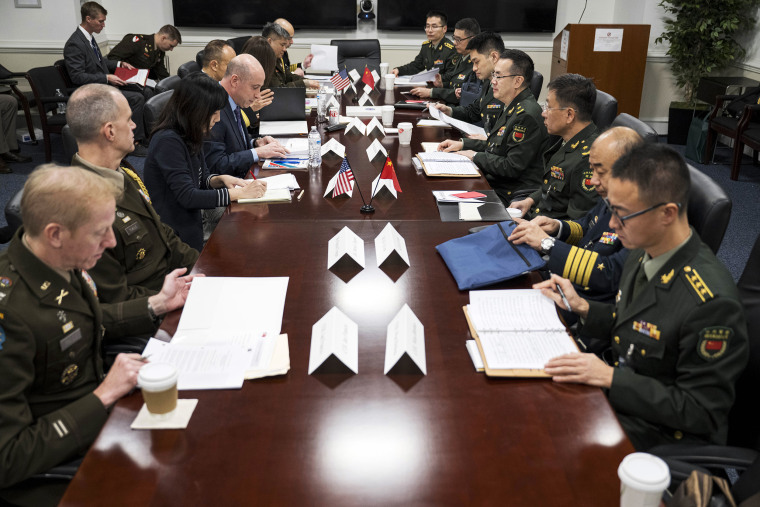
Military representatives from the U.S. and China met in Washington on Monday and Tuesday.Alexander Kubitza / AP
- SAVE
Create your free profile or log in to save this article
By Larissa Gao
HONG KONG — China said it would “never compromise” on its claims of sovereignty over Taiwan as the United States and China concluded two days of military talks in Washington, part of an effort to restore communication between the two countries’ militaries.
The talks were held days before Taiwan, a self-ruling island democracy, holds a presidential election that will shape its relationship with China, as well as ties between China and the U.S., Taiwan’s most important international backer.
China’s stated ambition to “reunify” with Taiwan, by force if necessary, is among the most sensitive issues between the U.S. and China, whose relationship has in recent years fallen to its lowest point in decades.
China said it would “not make any concession or compromise on the Taiwan question and demanded that the U.S. side abide by the one-China principle, honor relevant commitments, stop arming Taiwan, and not support Taiwan independence,” according to a readout published by the Chinese Defense Ministry on Wednesday.

Generational divide seen in views on China during Taiwan's election
JAN. 9, 202401:39The 17th round of the U.S.-China Defense Policy Coordination Talks was held Monday and Tuesday for the first time since 2021. They were led by Michael Chase, deputy assistant secretary of defense for China, Taiwan and Mongolia, and Maj. Gen. Song Yanchao, deputy director of China’s Central Military Commission Office for International Military Cooperation.
According to a Pentagon readout, Chase “highlighted the importance of maintaining open lines of military-to-military communication in order to prevent competition from veering into conflict.”
He also reiterated Washington’s commitment to its long-standing “One China” policy, under which the U.S. recognizes Beijing as the sole legitimate government of China but maintains unofficial relations with Taipei.
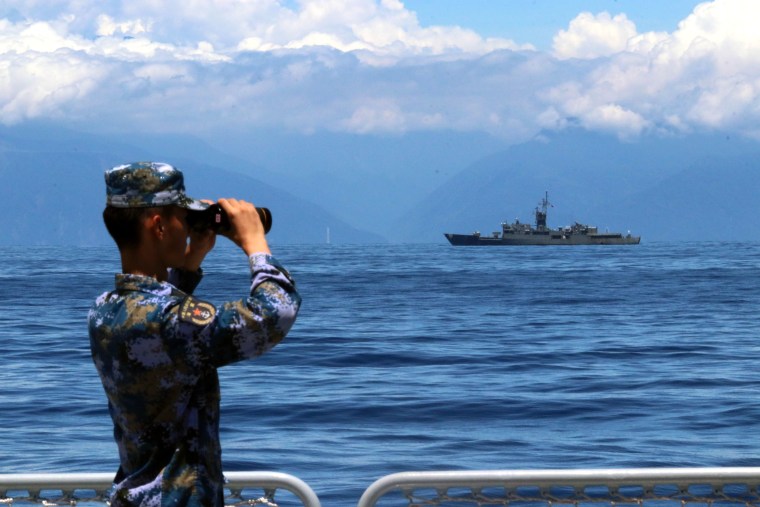
A Chinese soldier during combat exercises in the waters around Taiwan in August 2022.Xinhua News Agency / via Getty Images file
China said it was willing to develop a “healthy and stable” military relationship “on the basis of equality and respect.” It urged the U.S. to reduce its military presence and “provocation” in the South China Sea, a strategically important waterway that China claims virtually in its entirety, and to “stop supporting provocative actions” by certain countries, without identifying them.
The Pentagon said Chase “underscored the importance of respect for high seas freedom of navigation” in the face of continued Chinese “harassment” of Philippine vessels operating lawfully in the South China Sea.
President Joe Biden and Chinese Xi Jinping agreed to resume military ties at a meeting in San Francisco in November, their first meeting in a year. China had cut off military communications in 2022 after then-House Speaker Nancy Pelosi, D-Calif., visited Taiwan over its objections.
China has since increased its military activities in the Taiwan Strait, sending warplanes and naval vessels toward the island almost daily.
The talks at the Pentagon this week follow a video call last month between Gen. Charles Q. Brown Jr., chairman of the Joint Chiefs of Staff, and his Chinese counterpart, Gen. Liu Zhenli, the first high-level conversation between the two militaries in more than a year.
Taiwan, which rejects Beijing’s sovereignty claims, is on heightened alert ahead of its election Saturday. Government officials have accused China of attempting to influence voters through its military and other activities in the Taiwan Strait, including a series of balloons that have been spotted around the island since last month.
On Tuesday, the Taiwanese Defense Ministry issued an air raid alert saying China had launched a satellite and urging residents to be cautious. It later apologized for mistranslating the word “satellite” as “missile” in the English-language version of the alert and said the satellite had passed over the island without incident.
China has accused Taiwan’s governing Democratic Progressive Party of “hyping up the threat from the mainland” ahead of the election to gain voter support. Similarly, Taiwan’s main opposition party, the Kuomintang, said the government issued the alert Tuesday for political gain, which the Defense Ministry denied.
The satellite, named Einstein Probe, will be used to monitor “fleeting phenomena” in space, including the merging of black holes, the Chinese Academy of Sciences said in a post on Weibo, a Chinese social media platform. China tells U.S. it will ‘never compromise’ on Taiwan as the island’s election draws near
danielboon
TB Fanatic
Biden to send delegation to Taiwan after island’s election
The move is likely to irritate Beijing, which claims the self-ruling democracy as its territory and has called the election “a choice between war and peace.”NBC News NOW | NBC News
Jan. 11, 2024, 7:32 AM EST / Updated Jan. 11, 2024, 9:01 AM EST
By Janis Mackey Frayer and Larissa Gao
TAIPEI, Taiwan — The Biden administration will send an unofficial delegation to Taiwan after the island’s presidential and legislative elections this Saturday, in a move that is likely to irritate Beijing.
The results could drive the self-ruling democracy further toward or away from Beijing, which claims Taiwan as its territory. China, which has not ruled out the use of force in its effort to unify with the island, has framed the election as “a choice between war and peace.”
The status of Taiwan is among the most sensitive issues between China and the United States, the island’s most important international backer.
A senior Biden administration official confirmed the planned delegation Wednesday but did not provide details, saying its exact timing and makeup were still being decided.
The official, briefing reporters on the condition of anonymity, said such delegations were “the most effective way” for the U.S. to engage with Taiwan, with which it has unofficial relations, and that they contribute to peace and stability.
The Chinese Foreign Ministry said Thursday that China opposes “any form of official exchange” between the U.S. and Taiwan, calling Taiwan’s election an “internal affair.”
The U.S. should “cease official interactions with Taiwan, refrain from sending any mistaken signals to separatist forces, and avoid any form of interference in Taiwan’s regional elections,” spokesperson Mao Ning said at a regular news briefing in Beijing.

Generational divide seen in views on China during Taiwan's election
JAN. 9, 202401:39Earlier Thursday, China’s Taiwan Affairs Office warned against voting for Lai Ching-te, the governing Democratic Progressive Party’s presidential candidate and the front-runner in the race. In a statement, it said Lai was a “stubborn Taiwan independence worker” who if elected would promote separatist activities and “create a dangerous situation” in the Taiwan Strait.
Taiwan’s Foreign Ministry criticized the remarks as an attempt to intimidate Taiwanese voters and influence the election.
Lai, who is the current vice president, said at a news conference Tuesday that he would “maintain the status quo” consistent with the policies of President Tsai Ing-wen and that under his administration Taiwan’s door would “always be open to engagement with Beijing under the principles of equality and dignity.”
His closest challenger, polls show, is Hou Yu-ih from the main opposition party, the Kuomintang (KMT), which favors closer ties with Beijing. At a news conference on Thursday, his running mate, Jaw Shaw-kong, welcomed the delegation, saying it “shows the election is of great importance” to the U.S.
The third presidential candidate is Ko Wen-je, founder of the populist Taiwan People’s Party (TPP), which also favors closer ties. Both parties have criticized the DPP’s policies toward China as too confrontational.
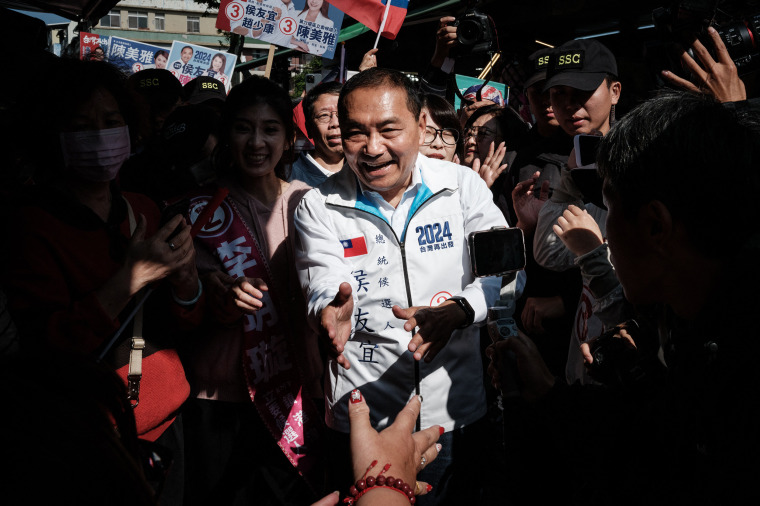
The Biden administration official said the U.S. had been in “regular touch” with all three men but had no preferred candidate.
“Regardless of whom is elected, our policy toward Taiwan will remain the same and our strong, unofficial relationship will also continue,” the official said.
The official said that the U.S. has “full confidence” in the electoral process in Taiwan, one of the strongest democracies in Asia, and that it opposed any external interference. Any disruption to peace and stability across the Taiwan Strait, a key shipping route, “would seriously damage the global economy,” the official said.
The official said the U.S. has a long history of sending unofficial delegations of former officials to Taiwan, including two since President Joe Biden took office, and that they were not viewed as “escalatory” by Beijing.
“The timing will be seen as provocative because it’s right after the election, but it still is a matter of the United States endorsing a free and fair democracy, regardless of who wins,” said Lev Nachman, a political scientist and assistant professor at National Chengchi University in Taipei.
The Biden administration official also said the U.S. and China would maintain recently reopened military channels of communication throughout the election and transition period. Military representatives from both sides held two days of talks in Washington this week as the two countries try to restore military ties that Beijing cut off in 2022 in protest over then-House Speaker Nancy Pelosi’s visit to Taiwan.
China also responded to Pelosi’s visit with its biggest-ever military drills around Taiwan, and it has stepped up military pressure ever since.
Biden and Chinese Xi Jinping agreed to resume military ties at a meeting in San Francisco in November, their first meeting in a year. At the same meeting, Biden reiterated that U.S. policy on Taiwan has not changed and the U.S. does not support Taiwan independence.
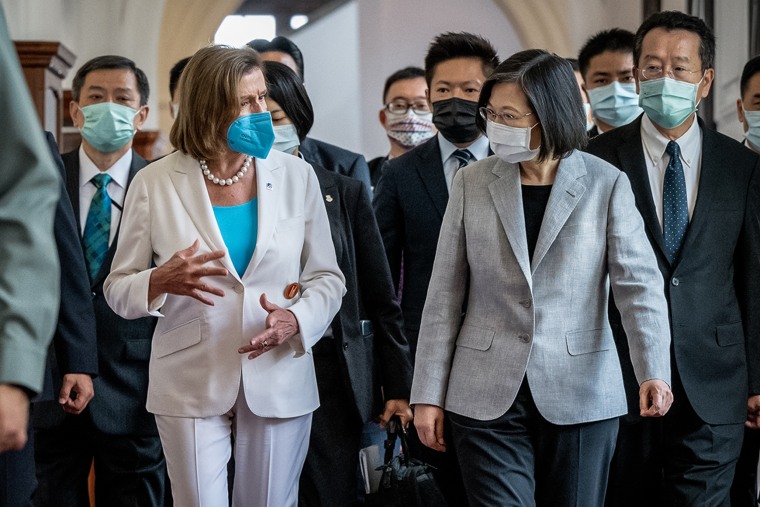
No matter the electoral outcome in Taiwan, relations between Taipei and Beijing are unlikely to change “on a big scale,” said Shelley Rigger, a professor of East Asian politics at Davidson College in North Carolina.
“I don’t think either party is really pro-China or pro-independence in the way that the other party’s supporters believe,” Rigger said, adding that while the KMT might get along better with Beijing, that doesn’t mean it “supports Taiwan being absorbed into China.”
Though Beijing prefers to deal with the KMT, Rigger said, “they can co-exist with DPP” and would rather avoid conflict with Taiwan.
“When the KMT was in power in Taiwan, back between 2008 and 2016, the PRC wasn’t particularly happy with what was happening at that time, either,” she said, using the initials for China’s formal name, the People’s Republic of China. “So the pattern of frustrated relations is that the two sides try to manage their relationship as best as they can.” Biden to send delegation to Taiwan after island’s election
vector7
Dot Collector
US confirms fuel transfer from Hawaii naval base to Philippines | Taiwan News | 2024-01-12 14:38:00Biden to send delegation to Taiwan after island’s election
Polls in Taiwan open up in 8 hours...
View: https://twitter.com/EndGameWW3/status/1745837969112486026
danielboon
TB Fanatic
EndGameWW3
@EndGameWW3
·
29m
China says will ‘crush’ Taiwan independence efforts before vote https://aje.io/7z3jof via
@AJEnglish
@EndGameWW3
·
29m
China says will ‘crush’ Taiwan independence efforts before vote https://aje.io/7z3jof via
@AJEnglish
Donghe Surfer
Veteran Member
If DPP wins presidency, best hope for KMT or TPP legislative-run branch, else neocons will push China into war, Ukraine sequel.
jward
passin' thru
OSINTdefender
@sentdefender
In the Past Week, the U.S. Navy in Coordination with the Filipino Government has reportedly begun the Pre-Deployment of Support Assets including Fuel from Bases in the Pacific to Former Naval Base Subic Bay in the Northern Philippines in anticipation for the Results of the ongoing Taiwanese Elections, which some Officials are worried may cause “Aggressive or Hostile Actions” by China against Taiwan.
@sentdefender
In the Past Week, the U.S. Navy in Coordination with the Filipino Government has reportedly begun the Pre-Deployment of Support Assets including Fuel from Bases in the Pacific to Former Naval Base Subic Bay in the Northern Philippines in anticipation for the Results of the ongoing Taiwanese Elections, which some Officials are worried may cause “Aggressive or Hostile Actions” by China against Taiwan.
jward
passin' thru
DPP’s Lai leads in early returns for Taiwan’s presidential election
This story has been made freely available as a public service to our readers. Please consider supporting SCMP’s journalism by subscribing in our New Year Flash Sale.
Counting has begun in Taiwan in one of the most closely watched elections this year.
The island’s 19 million-plus voters have cast their ballots to decide who will be the island’s new president in the three-way contest between Vice-President William Lai Ching-te from the incumbent Democratic Progressive Party (DPP), Hou Yu-ih from the Beijing-friendly Kuomintang (KMT) party, and Ko Wen-je from the newer Taiwan People’s Party (TPP).
The stakes are particularly high, with the results expected to shape cross-strait relations as well as US-China ties.
Results are expected by the evening. The vote-counting widget below updates every 10 minutes with the latest tallies.
Reporting by Lawrence Chung, Kinling Lo, Amber Wang, Dewey Sim, Hayley Wong and Josephine Ma
How the Taiwanese legislature is elected:
Taiwan’s Parliament is elected by semi-proportional representation. Seventy-three members are elected in a first-past-the-post system from special municipalities, counties and cities. Of the remainder, 34 are chosen by proportional representation from lists proposed by political parties and six are elected by indigenous peoples.
Taiwan’s Parliament is elected by semi-proportional representation. Seventy-three members are elected in a first-past-the-post system from special municipalities, counties and cities. Of the remainder, 34 are chosen by proportional representation from lists proposed by political parties and six are elected by indigenous peoples.
Plain Jane
Just Plain Jane
DPP's Lai has won.
 www.timebomb2000.com
www.timebomb2000.com
INTL - Taiwan Election - January 13, 2024
https://www.zerohedge.com/geopolitical/elections-looming-taiwan-battles-massive-cyber-threat-cybersecurity-expert With Elections Looming, Taiwan Battles Massive Cyber Threat: Cybersecurity Expert BY TYLER DURDEN TUESDAY, JAN 02, 2024 - 01:25 PM Authored by Venus Upadhayaya via The Epoch Times...
northern watch
TB Fanatic
jward
passin' thru
'We do not support' Taiwan's independence Biden says after vote
AFP
The United States on Saturday congratulated Taiwan’s president-elect Lai Ching-te, but maintained that Washington does not support independence for the self-ruled island claimed by Beijing.
Asked by reporters for Washington’s position on Taiwan, where independence-leaning Lai has pitched himself as a defender of the island’s democratic way of life, US President Joe Biden said: “We do not support independence.”
In a statement, Secretary of State Antony Blinken saluted Lai on his victory in Saturday’s pivotal vote and hailed the “robust democratic system and electoral process” of the self-ruled island.
Blinken added that Washington is “committed to maintaining cross-Strait peace and stability, and the peaceful resolution of differences, free from coercion and pressure.”
Lai, branded by China as a threat to peace, vowed Saturday to defend Taiwan against “intimidation” from China, after voters defied warnings from Beijing and swept him to election victory.
The United States said earlier this week that it plans to send an unofficial delegation to Taiwan after the vote and warned China against any military provocation.
Beijing reacted by slamming official visits between the island and the United States and called on Washington to “refrain from intervening” in Taiwan’s elections.
In his statement Saturday, Blinken added: “The partnership between the American people and the people on Taiwan, rooted in democratic values, continues to broaden and deepen across economic, cultural, and people-to-people ties.”
Communist China claims democratic Taiwan, separated from the mainland by a 110-mile (180-kilometer) strait, as its own and refuses to rule out using force to bring about “unification,” even if conflict does not appear imminent.
'We do not support' Taiwan's independence Biden says after vote
northern watch
TB Fanatic
jward
passin' thru
insiderpaper.com
China FM says Taiwan was 'never a country', never will be
AFP
~1 minute
Chinese Foreign Minister Wang Yi warned Sunday that Taiwan had “never” been a country and never would be, after voters on the self-ruled island defied Beijing’s warnings and chose pro-sovereignty candidate Lai Ching-te as president.
“Taiwan has never been a country. It wasn’t in the past, and it certainly won’t be in the future,” Foreign Minister Wang Yi said in a joint press conference with his Egyptian counterpart Sameh Shoukry in Cairo.
TagsChina Taiwan
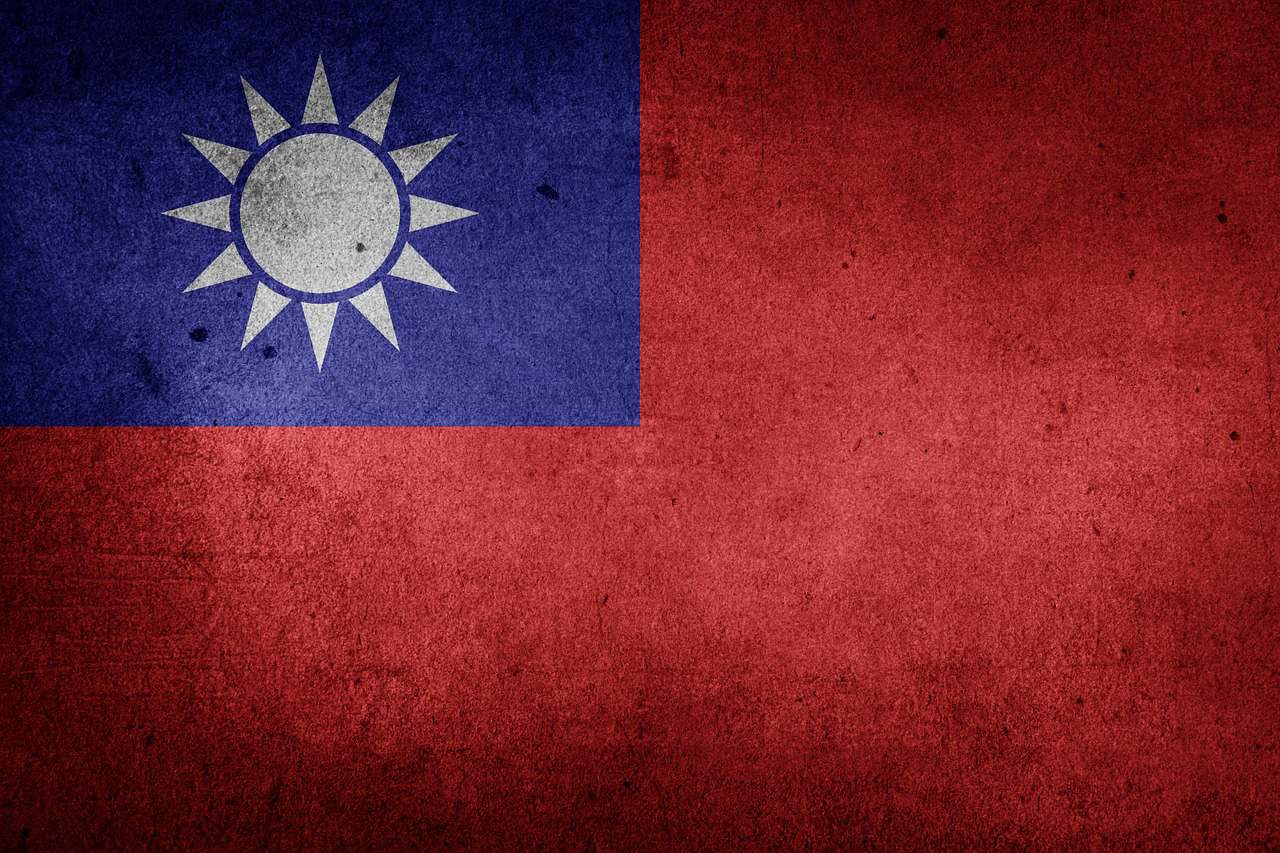
 insiderpaper.com
insiderpaper.com
China FM says Taiwan was 'never a country', never will be
AFP
~1 minute
Chinese Foreign Minister Wang Yi warned Sunday that Taiwan had “never” been a country and never would be, after voters on the self-ruled island defied Beijing’s warnings and chose pro-sovereignty candidate Lai Ching-te as president.
“Taiwan has never been a country. It wasn’t in the past, and it certainly won’t be in the future,” Foreign Minister Wang Yi said in a joint press conference with his Egyptian counterpart Sameh Shoukry in Cairo.
TagsChina Taiwan

China FM says Taiwan was 'never a country', never will be
Chinese Foreign Minister Wang Yi warned Sunday that Taiwan had "never" been a country and never would be, after voters on the self-ruled island defied
vector7
Dot Collector
What does $31 MILLION GIVEN TO BIDEN GET THE CHINESE FROM BIDEN Easy access into the United States, apparently
“ 7000% Increase in Illegals From China Crossing The Border…Biden has virtually eliminated any control on Chinese nationals entering the country with the administration basically “greasing the skids” to increase the flow of military-aged Chinese males entering the US.”
———————————————
( authored by: PAT DRONEYX )
WASHINGTON, DC- “ Many have wondered why the Chinese would steer in the vicinity of $31 million to the Biden crime family. Exactly what were they seeking in return? We may know the answer.
Writing in Substack, Sam Faddis asked the same question and believes he has come upon an answer. Biden, Faddis notes, has gone above and beyond in catering to the Chinese. Still, the most egregious step the Biden administration has taken is virtually eliminating any control on Chinese nationals entering the country.
“The administration has basically “greased the skids” to increase the flow of military-aged Chinese males entering the US, most across the southern border.
According to the Daily Caller, the administration has reduced the number of questions asked of illegal Chinese aliens upon entering the US. Until recently, they were required to answer 40 questions about their background. That number has been reduced to only five. Also, human smugglers know the five questions they will be asked and coach them on how to answer.
WATCH
RT 2min
View: https://youtu.be/eBBkS_cgJ3E?si=m_3CkdcxcqKbApsf
Where previously, Customs and Border Protection agents conducted searches of Chinese nationals’ cell phones to ascertain if they might be terrorists, human smugglers, or enemy agents, but that is no longer the case.
All of this is occurring despite concerns expressed by lawmakers in the Senate and House about possible infiltration by members of the People’s Liberation Army (PLA), while concerns about possible Chinese hostilities toward Taiwan are also rising.
“A group of Senators recently expressed concern over possible PLA infiltration in the United States to prepare for possible sabotage within the US:
“ “We write to you with concern that over 18,000 Chinese nationals have illegally crossed the southern border in Fiscal Year 2023, with some of these individuals having ties to the CCP’s People’s Liberation Army (PLA). July set the record for nationwide encounters with Chinese nationals with just over 6,100. 94.8 percent of Chinese national encounters in FY23 have been single adults. This trend poses a significant threat to our national security and warrants immediate attention and action from the Department of Homeland Security (DHS).””
“ “Furthermore, it is our understanding that not a single one of these individuals encountered has been detained for any length of time but rather benefitted from this administration’s policy of catch and release.
“ “Equally concerning, Chinese nationals crossing the border may include individuals who could engage in espionage activities or cyber-attacks against our critical infrastructure, government agencies, or private sector entities. There have been numerous documented instances of Chinese nationals, at the direction of the Chinese Communist Party (CCP), engaging in espionage, stealing military and economic secrets.””
The letter was signed by Sens. Thom Tillis (R-N.C.), Roger Marshall (R-Kansas), Mike Braun (R-Indiana), Pete Ricketts (R-Nebraska), and Marco Rubio (F-Florida) and sent to DHS Secretary Alejandro Mayorkas. DEMOCRATS SEEM UNCONCERNED about the Chinese threat.
In the House, one member likewise expressed concern about the Chinese threat.
“There’s no question that the PRC is exploiting the crisis at our border. It was reported yesterday that in this fiscal year, 125 people have entered this country–apprehended, not gotaways–that have matched to the terrorist watch list. Is the PRC exploiting the crisis on the Southern border for their own personal gain?””
“As mentioned above, the Chinese continue to signal a move on Taiwan, with Taiwan’s Defense Ministry reporting this week that China sent four balloons over the island, with three passing close to Ching Chuan Kang, a significant air force base. The other passed north of the port of Keelung, an important port that serves Taiwan's trade with Japan. Those incursions occurred as China has been saber-rattling against the island nation, threatening to use force to annex the country.
WATCH
youtube.com/watch?v=TMm6on…
“Faddis wrote the $31 million the Biden crime syndicate received from the Chinese has been repaid by leaving our borders wide open, failing to properly vet illegal military-aged Chinese men crossing those borders who are likely in the US conducting surveillance to be used against our country in conjunction with a possible move against Taiwan.
“I guess we know now what $31 million buys,” Faddis wrote.
View: https://twitter.com/Real_AnTheFacts/status/1746542165046514173?t=vL0nCu4M4-kngncEJPnLtw&s=19
“ 7000% Increase in Illegals From China Crossing The Border…Biden has virtually eliminated any control on Chinese nationals entering the country with the administration basically “greasing the skids” to increase the flow of military-aged Chinese males entering the US.”
———————————————
( authored by: PAT DRONEYX )
WASHINGTON, DC- “ Many have wondered why the Chinese would steer in the vicinity of $31 million to the Biden crime family. Exactly what were they seeking in return? We may know the answer.
Writing in Substack, Sam Faddis asked the same question and believes he has come upon an answer. Biden, Faddis notes, has gone above and beyond in catering to the Chinese. Still, the most egregious step the Biden administration has taken is virtually eliminating any control on Chinese nationals entering the country.
“The administration has basically “greased the skids” to increase the flow of military-aged Chinese males entering the US, most across the southern border.
According to the Daily Caller, the administration has reduced the number of questions asked of illegal Chinese aliens upon entering the US. Until recently, they were required to answer 40 questions about their background. That number has been reduced to only five. Also, human smugglers know the five questions they will be asked and coach them on how to answer.
WATCH
RT 2min
Where previously, Customs and Border Protection agents conducted searches of Chinese nationals’ cell phones to ascertain if they might be terrorists, human smugglers, or enemy agents, but that is no longer the case.
All of this is occurring despite concerns expressed by lawmakers in the Senate and House about possible infiltration by members of the People’s Liberation Army (PLA), while concerns about possible Chinese hostilities toward Taiwan are also rising.
“A group of Senators recently expressed concern over possible PLA infiltration in the United States to prepare for possible sabotage within the US:
“ “We write to you with concern that over 18,000 Chinese nationals have illegally crossed the southern border in Fiscal Year 2023, with some of these individuals having ties to the CCP’s People’s Liberation Army (PLA). July set the record for nationwide encounters with Chinese nationals with just over 6,100. 94.8 percent of Chinese national encounters in FY23 have been single adults. This trend poses a significant threat to our national security and warrants immediate attention and action from the Department of Homeland Security (DHS).””
“ “Furthermore, it is our understanding that not a single one of these individuals encountered has been detained for any length of time but rather benefitted from this administration’s policy of catch and release.
“ “Equally concerning, Chinese nationals crossing the border may include individuals who could engage in espionage activities or cyber-attacks against our critical infrastructure, government agencies, or private sector entities. There have been numerous documented instances of Chinese nationals, at the direction of the Chinese Communist Party (CCP), engaging in espionage, stealing military and economic secrets.””
The letter was signed by Sens. Thom Tillis (R-N.C.), Roger Marshall (R-Kansas), Mike Braun (R-Indiana), Pete Ricketts (R-Nebraska), and Marco Rubio (F-Florida) and sent to DHS Secretary Alejandro Mayorkas. DEMOCRATS SEEM UNCONCERNED about the Chinese threat.
In the House, one member likewise expressed concern about the Chinese threat.
“There’s no question that the PRC is exploiting the crisis at our border. It was reported yesterday that in this fiscal year, 125 people have entered this country–apprehended, not gotaways–that have matched to the terrorist watch list. Is the PRC exploiting the crisis on the Southern border for their own personal gain?””
“As mentioned above, the Chinese continue to signal a move on Taiwan, with Taiwan’s Defense Ministry reporting this week that China sent four balloons over the island, with three passing close to Ching Chuan Kang, a significant air force base. The other passed north of the port of Keelung, an important port that serves Taiwan's trade with Japan. Those incursions occurred as China has been saber-rattling against the island nation, threatening to use force to annex the country.
WATCH
youtube.com/watch?v=TMm6on…
“Faddis wrote the $31 million the Biden crime syndicate received from the Chinese has been repaid by leaving our borders wide open, failing to properly vet illegal military-aged Chinese men crossing those borders who are likely in the US conducting surveillance to be used against our country in conjunction with a possible move against Taiwan.
“I guess we know now what $31 million buys,” Faddis wrote.
View: https://twitter.com/Real_AnTheFacts/status/1746542165046514173?t=vL0nCu4M4-kngncEJPnLtw&s=19
jward
passin' thru
Ian Ellis
@ianellisjones
Update on Chinese air operations near Taiwan:
Beginning 1 January & for 13 consecutive days leading up to the election in Taiwan—China sent 32 balloons over & around the island.
An additional 100+ military aircraft (including drones), 60+ warships, & 3 satellites were detected.
View: https://twitter.com/ianellisjones/status/1746709135565975982?s=20
@ianellisjones
Update on Chinese air operations near Taiwan:
Beginning 1 January & for 13 consecutive days leading up to the election in Taiwan—China sent 32 balloons over & around the island.
An additional 100+ military aircraft (including drones), 60+ warships, & 3 satellites were detected.
View: https://twitter.com/ianellisjones/status/1746709135565975982?s=20
jward
passin' thru
Ian Ellis
@ianellisjones
Taiwan’s defense ministry said that any military aircraft that crossed into its territorial airspace would be considered “first strike.”
Since 7 December, 39 Chinese balloons have been tracked over 19 days.
A lot of good info in this thread if you want to get caught up:
View: https://twitter.com/ianellisjones/status/1746712899425317175?s=20
@ianellisjones
Taiwan’s defense ministry said that any military aircraft that crossed into its territorial airspace would be considered “first strike.”
Since 7 December, 39 Chinese balloons have been tracked over 19 days.
A lot of good info in this thread if you want to get caught up:
View: https://twitter.com/ianellisjones/status/1746712899425317175?s=20
jward
passin' thru
Mario Nawfal
@MarioNawfal
US DELEGATION VISIT TAIWAN’S NEWLY ELECTED PRESIDENT | CHINA HITS BACK
A delegation of former US officials met with Taiwan’s newly elected president to congratulate him and to reaffirm that the US’ commitment to Taiwan is “rock solid.”
The US’ stance on defending Taiwan militarily against China has fuelled tensions between both superpowers.
The Chinese Foreign Ministry dismissed the visit and stated that the election was China’s “internal affair” and that China “consistently opposes any form of official exchange between the US and Taiwan.”
So… how will the Taiwan issue be settled when both the world’s superpowers said they will act militarily when it comes to Taiwan?
Source: NBC News
View: https://twitter.com/MarioNawfal/status/1746953718510035022?s=20
@MarioNawfal
US DELEGATION VISIT TAIWAN’S NEWLY ELECTED PRESIDENT | CHINA HITS BACK
A delegation of former US officials met with Taiwan’s newly elected president to congratulate him and to reaffirm that the US’ commitment to Taiwan is “rock solid.”
The US’ stance on defending Taiwan militarily against China has fuelled tensions between both superpowers.
The Chinese Foreign Ministry dismissed the visit and stated that the election was China’s “internal affair” and that China “consistently opposes any form of official exchange between the US and Taiwan.”
So… how will the Taiwan issue be settled when both the world’s superpowers said they will act militarily when it comes to Taiwan?
Source: NBC News
View: https://twitter.com/MarioNawfal/status/1746953718510035022?s=20
jward
passin' thru
Indo-Pacific News - Geo-Politics & Defense News
@IndoPac_Info
Senior #Taiwan official said Beijing offered Nauru $100 million a year to drop relations with Taiwan & switch to #China
"Once again, it proves that China's trying everything they can – money diplomacy – to repress us," Taiwan's Deputy Foreign Minister Tien Chung-kwang told a hastily arranged media briefing after Nauru's announcement that the news had come suddenly.
"Taiwan did not bow to the pressure. We elected what we want to elect. That's unbearable for them," he added.
Taiwan lost one of its few remaining diplomatic allies Nauru to China on Monday, just days after it elected a new president, and accused China of attempting to pressure it while it affirmed the will of Taiwanese to go out into the world.
China claims Taiwan as its own territory with no right to state-to-state ties, a position Taiwan strongly disputes, and the two have for years traded accusations of using "dollar diplomacy" as they compete for diplomatic recognition.
Taiwan security officials told Reuters before Saturday's election that China was likely to continue to whittle away at the handful of countries - now down to a dozen - that maintain formal diplomatic ties with Taipei.
Lai Ching-te, repeatedly criticised by China before the poll as a dangerous separatist, won the election for the ruling Democratic Progressive Party (DPP) and will take office on May 20.
The government of the tiny Pacific Island nation of Nauru said that "in the best interests" of the country and its people it was seeking full resumption of diplomatic relations with China and would cut ties with Taiwan.
Nauru has recognised China before, between 2002 and 2005.
China and the United States have in recent years stepped up their competition for influence in the Pacific. In 2019, Kiribati and the Solomon Islands both ditched Taiwan for China in the space of a week.
The U.S. affirmed that its commitment to Taiwan is "rock solid" after Saturday's election, in comments delivered by former U.S. National Security Advisor Stephen Hadley on Monday during a trip to the island.
Taiwan's Deputy Foreign Minister Tien Chung-kwang told a hastily arranged media briefing after Nauru's announcement that the news had come suddenly.
Beijing specifically chose the sensitive timing after the election to target Nauru, Tien said, calling the move "ambush-like" and equivalent to a "a blatant attack on democracy", just as many countries were offering congratulations to Taiwan on the smooth voting process.
China had offered Nauru, with a population of 12,500, money far in excess of what Taiwan provides its allies, Tien said.
"Once again, it proves that China's trying everything they can – money diplomacy – to repress us," he said.
A senior Taiwan official briefed on the matter, speaking on condition of anonymity as they were not authorised to speak to the media, said Beijing is offering Nauru $100 million a year.
A Nauru government spokesperson declined to comment
China's foreign ministry said it appreciated and welcomed Nauru's decision. It did not directly answer a question on how much money it offered.
"Nauru, as a sovereign state, has made the right choice to resume diplomatic relations with China independently," ministry spokesperson Mao Ning said in Beijing.
Taiwan's presidential office said Beijing's move amounted to suppression of the island's diplomatic space but could not undermine the will of the Taiwanese people to go to the world, nor could it change the fact that Taiwan and China are not subordinate to each other.
Taiwan's 12 remaining diplomatic allies include the Vatican, Guatemala and Paraguay, plus Palau, Tuvalu and the Marshall Islands in the Pacific.
Taiwan Foreign Minister Joseph Wu is in Guatemala attending the inauguration of its new president.
Nauru is a small and remote Pacific Island nation that uses Australian currency and generates revenue from fishing licences and hosting a regional processing centre for refugees for the Australian government.
An Australian bank providing the country's only banking service announced in December its plan to close its Nauruan operation.
Australia provides policing support and is a major aid donor, contributing A$46 million (US$31 million) in development assistance in 2023. The refugee processing centre was forecast to generate A$160 million in 2024, although Australia plans to wind it down over time.
(A$1 = 0.6671 US$)
Reporting by Kirsty Needham and Yimou Lee; Additional reporting by Liz Lee in Beijing; Writing by Ben Blanchard; Editing by Tom Hogue, Michael Perry and Edmund Klamann
@IndoPac_Info
Senior #Taiwan official said Beijing offered Nauru $100 million a year to drop relations with Taiwan & switch to #China
"Once again, it proves that China's trying everything they can – money diplomacy – to repress us," Taiwan's Deputy Foreign Minister Tien Chung-kwang told a hastily arranged media briefing after Nauru's announcement that the news had come suddenly.
"Taiwan did not bow to the pressure. We elected what we want to elect. That's unbearable for them," he added.
Taiwan lost one of its few remaining diplomatic allies Nauru to China on Monday, just days after it elected a new president, and accused China of attempting to pressure it while it affirmed the will of Taiwanese to go out into the world.
China claims Taiwan as its own territory with no right to state-to-state ties, a position Taiwan strongly disputes, and the two have for years traded accusations of using "dollar diplomacy" as they compete for diplomatic recognition.
Taiwan security officials told Reuters before Saturday's election that China was likely to continue to whittle away at the handful of countries - now down to a dozen - that maintain formal diplomatic ties with Taipei.
Lai Ching-te, repeatedly criticised by China before the poll as a dangerous separatist, won the election for the ruling Democratic Progressive Party (DPP) and will take office on May 20.
The government of the tiny Pacific Island nation of Nauru said that "in the best interests" of the country and its people it was seeking full resumption of diplomatic relations with China and would cut ties with Taiwan.
Nauru has recognised China before, between 2002 and 2005.
China and the United States have in recent years stepped up their competition for influence in the Pacific. In 2019, Kiribati and the Solomon Islands both ditched Taiwan for China in the space of a week.
The U.S. affirmed that its commitment to Taiwan is "rock solid" after Saturday's election, in comments delivered by former U.S. National Security Advisor Stephen Hadley on Monday during a trip to the island.
Taiwan's Deputy Foreign Minister Tien Chung-kwang told a hastily arranged media briefing after Nauru's announcement that the news had come suddenly.
Beijing specifically chose the sensitive timing after the election to target Nauru, Tien said, calling the move "ambush-like" and equivalent to a "a blatant attack on democracy", just as many countries were offering congratulations to Taiwan on the smooth voting process.
China had offered Nauru, with a population of 12,500, money far in excess of what Taiwan provides its allies, Tien said.
"Once again, it proves that China's trying everything they can – money diplomacy – to repress us," he said.
A senior Taiwan official briefed on the matter, speaking on condition of anonymity as they were not authorised to speak to the media, said Beijing is offering Nauru $100 million a year.
A Nauru government spokesperson declined to comment
China's foreign ministry said it appreciated and welcomed Nauru's decision. It did not directly answer a question on how much money it offered.
"Nauru, as a sovereign state, has made the right choice to resume diplomatic relations with China independently," ministry spokesperson Mao Ning said in Beijing.
Taiwan's presidential office said Beijing's move amounted to suppression of the island's diplomatic space but could not undermine the will of the Taiwanese people to go to the world, nor could it change the fact that Taiwan and China are not subordinate to each other.
Taiwan's 12 remaining diplomatic allies include the Vatican, Guatemala and Paraguay, plus Palau, Tuvalu and the Marshall Islands in the Pacific.
Taiwan Foreign Minister Joseph Wu is in Guatemala attending the inauguration of its new president.
Nauru is a small and remote Pacific Island nation that uses Australian currency and generates revenue from fishing licences and hosting a regional processing centre for refugees for the Australian government.
An Australian bank providing the country's only banking service announced in December its plan to close its Nauruan operation.
Australia provides policing support and is a major aid donor, contributing A$46 million (US$31 million) in development assistance in 2023. The refugee processing centre was forecast to generate A$160 million in 2024, although Australia plans to wind it down over time.
(A$1 = 0.6671 US$)
Reporting by Kirsty Needham and Yimou Lee; Additional reporting by Liz Lee in Beijing; Writing by Ben Blanchard; Editing by Tom Hogue, Michael Perry and Edmund Klamann
jward
passin' thru
Indo-Pacific News - Geo-Politics & Defense News
@IndoPac_Info
Expect a #Chinese show of force against #Taiwan soon, says INDOPACOM head
“When something occurs that they don’t like, they tend to take actions,” said Adm. John Aquilino.
China is likely to demonstrate “force against Taiwan in the near term” because of the recent election, the head of U.S. Indo-Pacific Command said—and they will probably blame the United States.
“The pressure campaign against Taiwan continues, and we’re watching it in the wake of the elections,” Adm. John Aquilino said Tuesday at a conference hosted by the Pacific Forum.
“Their actions over the past number of years have been pretty consistent. When something occurs that they don’t like, they tend to take actions,” Aquilino said, noting that China increased its military harassment after then-Speaker of the House Nancy Pelosi visited the island in 2022.
China is “clearly not happy,” and the U.S. should “not be surprised” if they “attempt to spin it in the information space as the United States as the aggressor,” he said.
“I don’t know how you connect those dots, but they’re pretty effective in the information space. Doesn’t have to be true. They’ve just got to say it enough times.”
On Saturday, Taiwan elected as president a candidate from the ruling Democratic Progressive Party, in a blow to China’s attempts to more closely control the island. President Biden said after the election that he does not support independence for Taiwan.
Three days later, the State Department’s Mira Resnick told Defense One the administration’s position has not changed.
The U.S. wants to ensure “peace in the Taiwan Strait, that there is security for Taiwan, and security in the United States,” said Resnick, the deputy assistant secretary for regional security in the bureau of political-military affairs.
To that end, the U.S. has worked to “both speed [foreign military sales] items to Taiwan that they need, and to make sure that we’re carving out from our own resources… grant assistance that can be useful to Taiwan, which is something we’ve never done before.”
In a conflict, “Taiwan will need to have things that are already positioned on island, so we are looking to make sure that Taiwan has what it needs and that they will continue to have what they need in any sort of contingency,” she said.
Regarding the elections, Aquilino said the U.S. and its allies and partners must “understand what should come, we should expect it,” but we should also “push back against mis- and disinformation.”
And, he said, U.S. and “like-minded nations” must be cognizant of the fact that China’s “expansive claims in the South China Sea are not just thought anymore. What we are seeing as it applies to Second Thomas Shoal and our Philippine partners is that the rhetoric and the actions, whether they be lawfare, information warfare, or physical actions, they are now enforcing or attempting to enforce that illegal claim.”
@IndoPac_Info
Expect a #Chinese show of force against #Taiwan soon, says INDOPACOM head
“When something occurs that they don’t like, they tend to take actions,” said Adm. John Aquilino.
China is likely to demonstrate “force against Taiwan in the near term” because of the recent election, the head of U.S. Indo-Pacific Command said—and they will probably blame the United States.
“The pressure campaign against Taiwan continues, and we’re watching it in the wake of the elections,” Adm. John Aquilino said Tuesday at a conference hosted by the Pacific Forum.
“Their actions over the past number of years have been pretty consistent. When something occurs that they don’t like, they tend to take actions,” Aquilino said, noting that China increased its military harassment after then-Speaker of the House Nancy Pelosi visited the island in 2022.
China is “clearly not happy,” and the U.S. should “not be surprised” if they “attempt to spin it in the information space as the United States as the aggressor,” he said.
“I don’t know how you connect those dots, but they’re pretty effective in the information space. Doesn’t have to be true. They’ve just got to say it enough times.”
On Saturday, Taiwan elected as president a candidate from the ruling Democratic Progressive Party, in a blow to China’s attempts to more closely control the island. President Biden said after the election that he does not support independence for Taiwan.
Three days later, the State Department’s Mira Resnick told Defense One the administration’s position has not changed.
The U.S. wants to ensure “peace in the Taiwan Strait, that there is security for Taiwan, and security in the United States,” said Resnick, the deputy assistant secretary for regional security in the bureau of political-military affairs.
To that end, the U.S. has worked to “both speed [foreign military sales] items to Taiwan that they need, and to make sure that we’re carving out from our own resources… grant assistance that can be useful to Taiwan, which is something we’ve never done before.”
In a conflict, “Taiwan will need to have things that are already positioned on island, so we are looking to make sure that Taiwan has what it needs and that they will continue to have what they need in any sort of contingency,” she said.
Regarding the elections, Aquilino said the U.S. and its allies and partners must “understand what should come, we should expect it,” but we should also “push back against mis- and disinformation.”
And, he said, U.S. and “like-minded nations” must be cognizant of the fact that China’s “expansive claims in the South China Sea are not just thought anymore. What we are seeing as it applies to Second Thomas Shoal and our Philippine partners is that the rhetoric and the actions, whether they be lawfare, information warfare, or physical actions, they are now enforcing or attempting to enforce that illegal claim.”
jward
passin' thru
Indo-Pacific News - Geo-Politics & Defense News
@IndoPac_Info
#China is unable to invade #Taiwan, most #US and Taiwanese experts say
Most U.S. and Taiwanese experts polled in a new survey say China lacks the capabilities to effectively carry out an amphibious invasion of Taiwan but is well-positioned to execute a blockade.
Why it matters: China's growing aggression towards Taiwan has made the region a dangerous potential flashpoint and could trigger a military conflict between the U.S. and China.
Details: The survey, conducted by the Center for Strategic and International Studies' (CSIS) China Power Project and Taiwan's Institute for National Defense and Security Research, polled 52 U.S. experts and 35 Taiwanese experts.
Just 26% of U.S. experts and 17% of Taiwanese experts agreed China has the military capability to effectively launch an amphibious invasion of Taiwan within the next five years.
One reason for this assessment is that an "amphibious invasion would require a much larger commitment of military forces than a quarantine or blockade, and the operations involved would be significantly more complicated," according to the CSIS report.
Experts from both countries largely agreed China has the ability to carry out a quarantine or a blockade within the next five years.
90% of U.S. experts and 62% of Taiwan experts said China could enact a quarantine — a limited blockade targeting commercial rather than military activity that would be carried out not by China's military but by its coast guard or other law enforcement vessels.
80% of U.S. experts and 60% of Taiwan experts said China could execute a blockade, which would involve both commercial and military activity and be led directly by China's military.
Of note: Taiwanese experts overall had a lower threat perception towards China than U.S. experts, and consistently rated China as having lower capabilities than the U.S. respondents.
View: https://twitter.com/IndoPac_Info/status/1749640770234294726?s=20
@IndoPac_Info
#China is unable to invade #Taiwan, most #US and Taiwanese experts say
Most U.S. and Taiwanese experts polled in a new survey say China lacks the capabilities to effectively carry out an amphibious invasion of Taiwan but is well-positioned to execute a blockade.
Why it matters: China's growing aggression towards Taiwan has made the region a dangerous potential flashpoint and could trigger a military conflict between the U.S. and China.
Details: The survey, conducted by the Center for Strategic and International Studies' (CSIS) China Power Project and Taiwan's Institute for National Defense and Security Research, polled 52 U.S. experts and 35 Taiwanese experts.
Just 26% of U.S. experts and 17% of Taiwanese experts agreed China has the military capability to effectively launch an amphibious invasion of Taiwan within the next five years.
One reason for this assessment is that an "amphibious invasion would require a much larger commitment of military forces than a quarantine or blockade, and the operations involved would be significantly more complicated," according to the CSIS report.
Experts from both countries largely agreed China has the ability to carry out a quarantine or a blockade within the next five years.
90% of U.S. experts and 62% of Taiwan experts said China could enact a quarantine — a limited blockade targeting commercial rather than military activity that would be carried out not by China's military but by its coast guard or other law enforcement vessels.
80% of U.S. experts and 60% of Taiwan experts said China could execute a blockade, which would involve both commercial and military activity and be led directly by China's military.
Of note: Taiwanese experts overall had a lower threat perception towards China than U.S. experts, and consistently rated China as having lower capabilities than the U.S. respondents.
View: https://twitter.com/IndoPac_Info/status/1749640770234294726?s=20
northern watch
TB Fanatic
jward
passin' thru
Indo-Pacific News - Geo-Politics & Defense News
@IndoPac_Info
#USNavy sends first warship through #Taiwan Strait post-election
The United States Navy sailed its first warship through the sensitive Taiwan Strait on Wednesday following presidential and parliamentary elections on the island, drawing the ire of Beijing.
The U.S. Navy said the destroyer USS John Finn transited through a corridor in the Taiwan Strait that was "beyond the territorial sea of any coastal state".
"John Finn's transit through the Taiwan Strait demonstrates the United States' commitment to upholding freedom of navigation for all nations as a principle," the U.S. Navy said in its statement.
"No member of the international community should be intimidated or coerced into giving up their rights and freedoms."
China's military said the mission was "public hyping" and that its forces monitored and warned the ship.
"Recently, the U.S. military has frequently carried out provocative acts to maliciously undermine regional peace and stability," the People's Liberation Army's Eastern Theatre Command said in a statement.
Taiwan's defence ministry said the ship sailed in a southerly direction through the strait, adding it monitored the movement and the situation was "normal".
The U.S. Navy's last announced passage of a warship through the strait was in early November, joined that time by a Canadian frigate.
The latest transit came as leaders of the U.S. House of Representatives Taiwan Caucus, Republican Representative Mario Diaz Balart and Democratic Representative Ami Bera, visit Taipei, as a show of support after the island's Jan. 13 election.
China, which also views Taiwan as its own territory, has over the past four years regularly sent warplanes and warships into the skies and waters around the island as it seeks to assert sovereignty claims that the Taipei government rejects.
Last week, Taiwan's defence ministry said it detected 18 Chinese air force planes operating around Taiwan and carrying out "joint combat readiness patrols" with Chinese warships, the first large-scale military activity after the Taiwanese election.
@IndoPac_Info
#USNavy sends first warship through #Taiwan Strait post-election
The United States Navy sailed its first warship through the sensitive Taiwan Strait on Wednesday following presidential and parliamentary elections on the island, drawing the ire of Beijing.
The U.S. Navy said the destroyer USS John Finn transited through a corridor in the Taiwan Strait that was "beyond the territorial sea of any coastal state".
"John Finn's transit through the Taiwan Strait demonstrates the United States' commitment to upholding freedom of navigation for all nations as a principle," the U.S. Navy said in its statement.
"No member of the international community should be intimidated or coerced into giving up their rights and freedoms."
China's military said the mission was "public hyping" and that its forces monitored and warned the ship.
"Recently, the U.S. military has frequently carried out provocative acts to maliciously undermine regional peace and stability," the People's Liberation Army's Eastern Theatre Command said in a statement.
Taiwan's defence ministry said the ship sailed in a southerly direction through the strait, adding it monitored the movement and the situation was "normal".
The U.S. Navy's last announced passage of a warship through the strait was in early November, joined that time by a Canadian frigate.
The latest transit came as leaders of the U.S. House of Representatives Taiwan Caucus, Republican Representative Mario Diaz Balart and Democratic Representative Ami Bera, visit Taipei, as a show of support after the island's Jan. 13 election.
China, which also views Taiwan as its own territory, has over the past four years regularly sent warplanes and warships into the skies and waters around the island as it seeks to assert sovereignty claims that the Taipei government rejects.
Last week, Taiwan's defence ministry said it detected 18 Chinese air force planes operating around Taiwan and carrying out "joint combat readiness patrols" with Chinese warships, the first large-scale military activity after the Taiwanese election.
danielboon
TB Fanatic
This relates to region as China is doing exactly what Duduman has prophesied
View: https://twitter.com/EndGameWW3/status/1751006189717016776
This relates to region as China is doing exactly what Duduman has prophesied View: https://twitter.com/EndGameWW3/status/1751006189717016776
If the "golden screwdrivers" haven't been taken out of the glass cabinets in Tokyo or Seoul yet I don't know when would be the time....

